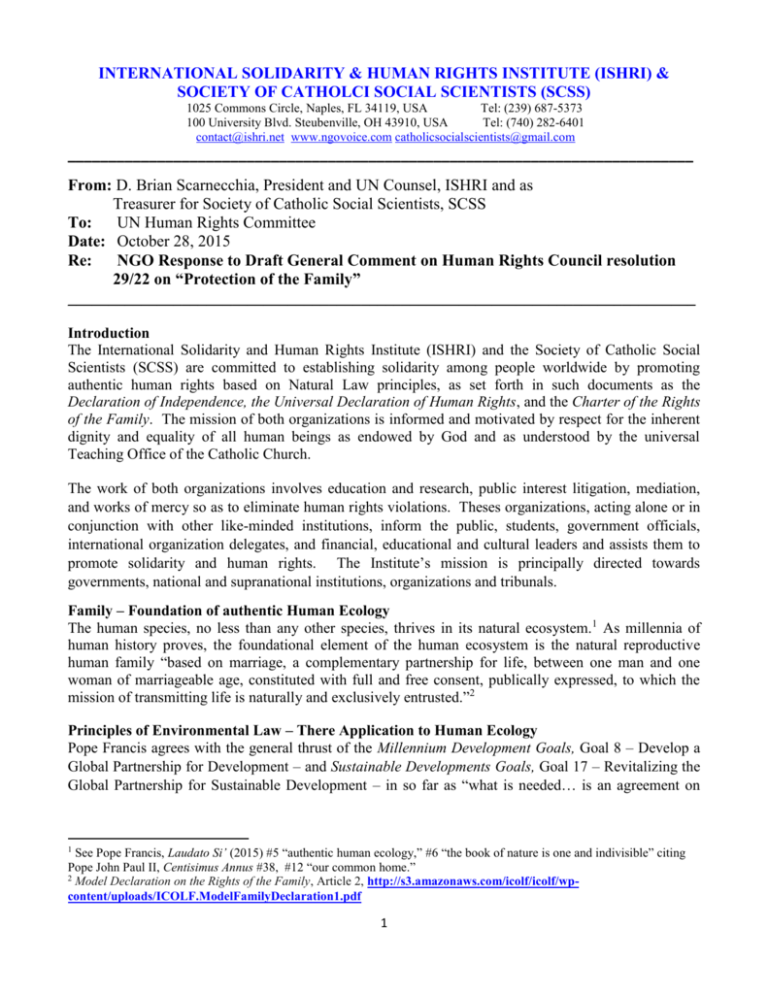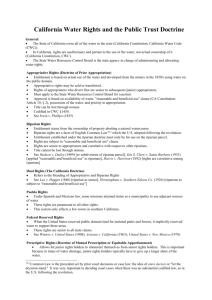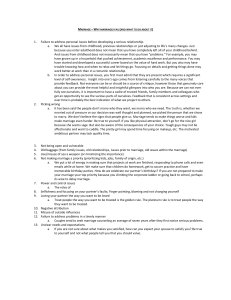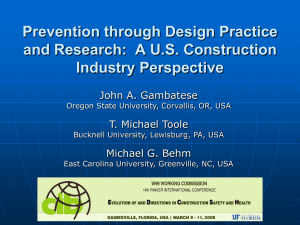scss - Office of the High Commissioner for Human Rights
advertisement

INTERNATIONAL SOLIDARITY & HUMAN RIGHTS INSTITUTE (ISHRI) & SOCIETY OF CATHOLCI SOCIAL SCIENTISTS (SCSS) 1025 Commons Circle, Naples, FL 34119, USA Tel: (239) 687-5373 100 University Blvd. Steubenville, OH 43910, USA Tel: (740) 282-6401 contact@ishri.net www.ngovoice.com catholicsocialscientists@gmail.com _____________________________________________________________________________ From: D. Brian Scarnecchia, President and UN Counsel, ISHRI and as Treasurer for Society of Catholic Social Scientists, SCSS To: UN Human Rights Committee Date: October 28, 2015 Re: NGO Response to Draft General Comment on Human Rights Council resolution 29/22 on “Protection of the Family” _____________________________________________________________________________ Introduction The International Solidarity and Human Rights Institute (ISHRI) and the Society of Catholic Social Scientists (SCSS) are committed to establishing solidarity among people worldwide by promoting authentic human rights based on Natural Law principles, as set forth in such documents as the Declaration of Independence, the Universal Declaration of Human Rights, and the Charter of the Rights of the Family. The mission of both organizations is informed and motivated by respect for the inherent dignity and equality of all human beings as endowed by God and as understood by the universal Teaching Office of the Catholic Church. The work of both organizations involves education and research, public interest litigation, mediation, and works of mercy so as to eliminate human rights violations. Theses organizations, acting alone or in conjunction with other like-minded institutions, inform the public, students, government officials, international organization delegates, and financial, educational and cultural leaders and assists them to promote solidarity and human rights. The Institute’s mission is principally directed towards governments, national and supranational institutions, organizations and tribunals. Family – Foundation of authentic Human Ecology The human species, no less than any other species, thrives in its natural ecosystem.1 As millennia of human history proves, the foundational element of the human ecosystem is the natural reproductive human family “based on marriage, a complementary partnership for life, between one man and one woman of marriageable age, constituted with full and free consent, publically expressed, to which the mission of transmitting life is naturally and exclusively entrusted.”2 Principles of Environmental Law – There Application to Human Ecology Pope Francis agrees with the general thrust of the Millennium Development Goals, Goal 8 – Develop a Global Partnership for Development – and Sustainable Developments Goals, Goal 17 – Revitalizing the Global Partnership for Sustainable Development – in so far as “what is needed… is an agreement on See Pope Francis, Laudato Si’ (2015) #5 “authentic human ecology,” #6 “the book of nature is one and indivisible” citing Pope John Paul II, Centisimus Annus #38, #12 “our common home.” 2 Model Declaration on the Rights of the Family, Article 2, http://s3.amazonaws.com/icolf/icolf/wpcontent/uploads/ICOLF.ModelFamilyDeclaration1.pdf 1 1 systems of governance for the whole range of so-called ‘global commons.’” 3 The global commons is composed of multi-layered ecosystems, each integral in its own right and interdependent with each other. Good stewardship of the planet requires a respectful balancing of the principles of flourishing intrinsic to each ecosystem. Developments in environmental law have made plain that certain basic principles must be employed in order to ensure integral and sustainable human development. The most fundamental of these rational principles is trust, expressed in the jus cogens norm that “promises are meant to be kept” features of which have been recognized in international treaties outlawing crimes against humanity and genocide.4 In particular, the preemptory norm of trust finds articulation in the Public Trust Doctrine, the slate upon which all political constitutions are written and “the DNA from which legitimate power is created…”5 The Public Trust Doctrine rightly understood, therefore, offers promise for the sound governance of the whole global commons including the integral development of the human family. The Public Trust Doctrine – Its Basic Features and Scope The PTD is a creature of trust law. It provides for the wise stewardship of common property held in trust for the benefit of all people. It demands that public authorities exercise their fiduciary duty to both conserve and provide public access to the trust resources. Originally the PTD was bound to lands subject to tidal waters under English and American common law. “At common law, the title and dominion in lands flowed by the tide water were in the King for the benefit of the nation…. Upon the American Revolution, these rights… were vested in the original States…”6 Today the scope of the PTD has been expanded and it has been adopted by many nations, especially in the Developing World, to protect all natural resources.7 Moreover, the PTD has been recommended as perhaps the most effective way to realize the goals of Rio + 20 since “the PTD converts stewardship principles to substantive stewardship requirements.”8 The PTD is analogous to the Common Heritage of Humanity (CHH) provisions already included in both hard and soft international law.9 Public Trust Doctrine – the Precautionary and Natural Use Principles Trustees have an affirmative fiduciary duty under the PTD to be proactive and protect trust assets before it is too late. The law should and must enable them to challenge effectively threats to public trust assets. “Many environmental conflicts result in degradation because there is not adequate scientific evidence to Laudato Si’, #174. See U.N. Doc. A/CONF.39/27 (1969), reprinted in 63 Am.J.Int’l L. 875 (1969); Marc Bossuyt en Jan Wouters (2005): Grondlijnen van international recht, Intersentia, Antwerpen enz., p. 92; Prosecutor v. Furundzija, International Criminal Tribunal for Former Yugoslavia, 2002, 121 International Law Reports 213 (2002). 5 See Gerald Torres and Nathan Bellinger, “The Public Trust Doctrine: The Law’s DNA,” 4 WAKE FOREST J.L. & POL’Y, 284, 281, 288 (2014). 6 Shively v. Bowlby, 152 U.S. 1, 14-15 (1894). 7 See Blumm & Guthrie, “Internationalizing the Public Trust Doctrine: Natural Law and Constitutional and Statutory Approaches to Fulfilling the Saxion Vision,” 45 U.C. DAVIS L REV. 741, 760–800 noting that in India, Pakistan, Philippines, Uganda, Kenya, Nigeria, South Africa, Brazil and Ecuador all natural resources are held in public trust). 8 See Mary Turnipseed, et al., “The Public Trust Doctrine and Rio + 20” (2012) turnipseed@nceas.useas.ucsb.edu. 9 See Loretta Feris, “The Public Trust Doctrine and Liability for Historic Water Pollution in South Africa,” 8/1 Law, Environment and Development Journal (2012) www.lead-journal.org/content/2001.pdf (last accessed 9/3/2015) noting that CHH terms are included in several multilateral treaties including the Convention Concerning the Protection of the World Cultural and Natural Heritage, Paris, 16 Nov. 1972, 1037 UNTS 151, the Agreement Governing the Activities of States on the Moon and Other Celestial Bodies, New York, 5 Dec. 1979, 1363 UNTS 3, art 5,7, 11, the Antarctic Treaty, Washington, 1 Dec. 1959, 402 UNTS 71, preamble, the Protocol on Environmental Protections to the Artic Treaty, Madrid, 4 Oct. 1991, 30ILM 1455 (1991), and the UN Law of the Sea Convention, Montego Bay, 10 Dec 1982, 1833 UNTS 3). 3 4 2 support regulation.”10 The precautionary principle essentially shifts the burden of proof to those who propose activity which threatens harm to an ecosystem. “Note that the precautionary approach dismantles the general argument of industry that it should not be regulated until the agency has proven harm from the industry practice.”11 Pope Francis endorsed the precautionary principle: “This precautionary principle makes it possible to protect those who are most vulnerable and whose ability to defend their interests and to assemble incontrovertible evidence is limited. If objective information suggests that serious and irreversible damage may result, a project should be halted or modified, even in the absence of indisputable proof. Here the burden of proof is effectively reversed…”12 The “Natural Use Principle” stipulates that there is no right to develop land so as to change “its natural character” to “non-indigenous property uses” because a landowner is only entitled to reasonable expectations of what can be done to the land given “the natural character of the property and nature’s laws.”13 Conclusions and Recommendations The right of future generations to enjoy ecological public trust assets must not be impaired by those living today. Pope Francis warns, “Young people demand change. They wonder how anyone can claim to be building a better future without thinking of the environmental crisis and the sufferings of the excluded.” The Human Rights Council must ask whether a human ecosystem crisis, a demographic winter with plummeting population decline, has already been set in motion that threatens the biodiversity of the human race.14 The Human Rights Council must employ the Natural Use Principle and investigate whether certain non-indigenous cultural practices being imposed upon native populations in the Developing World, such as same-sex marriage and abortion actually turn the “natural character” of human sexuality from its procreative purpose and threaten irreparable harm to the biodiversity of indigenous people. The Human Rights Council must also invoke the Precautionary Principle and call for a halt to the legalization of same sex marriage in light of substantial evidence from the social sciences that it is not in the best interests of children to be raised by same sex parents.15 These public and private actors have failed to meet their burden of proof – to show with clear and convincing evidence that a host of social ills will not follow upon violations of the rights safeguarded in Model Declaration on the Rights of the Family, cited above.16 The Human Rights Council cannot ignore that these practices collectively and disproportionately affect the poor whose posterity are “excluded.” An agreement on systems of governance for the whole range of so-called global commons cannot rest upon such injustice and invidious discrimination against the poor. THEREFORE, this Human Rights Council must denounce the antenatal practices of abortion and same sex marriage for what they are – violations of integral human ecology, crimes against humanity and eugenic genocide. Whereas the book of nature is one and includes both the natural and human Michael C. Blumm and Mary C. Wood, Teacher’s Manual, The Public Trust Doctrine: In Environmental and Natural Resource Law (2014), 68). 11 Id at 70. 12 Laudato Si #186. 13 Blumm and Wood, Teacher’s Manual, 55, 50. 14 See “Demographic Winter: The Decline of the Human Family,” SPB documentary, LLC, 2008) www.demographicwinter.com. 15 See Donald Paul Sullins, “Emotional Problems among Children with Same-Sex Parents: Difference by Definition,” British Journal of Education, Society and Behavioral Science 7(2):99-120, (2015). 16 See footnote no. 2. Also see, Witherspoon Institute, “Marriage and the Public Good: Ten Principles,” http://winst.org/wpcontent/uploads/WI_Marriage_and_the_Public_Good.pdf (evidence from the social sciences showing the benefits that accrue to society from natural marriage and the procreative family); “Brief of Amici Curiae 100 Scholars of Marriage,” Obergefell v. Hodges, http://www.supremecourt.gov/ObergefellHodges/AmicusBriefs/14-556_100_Scholars_of_Marriage.pdf (arguing the natural procreative family is a delicate ecosystem with inherent laws for human flourishing). 10 3 environment, we may not do less for the human family, made in God’s image, than we do for flora and fauna. 4











